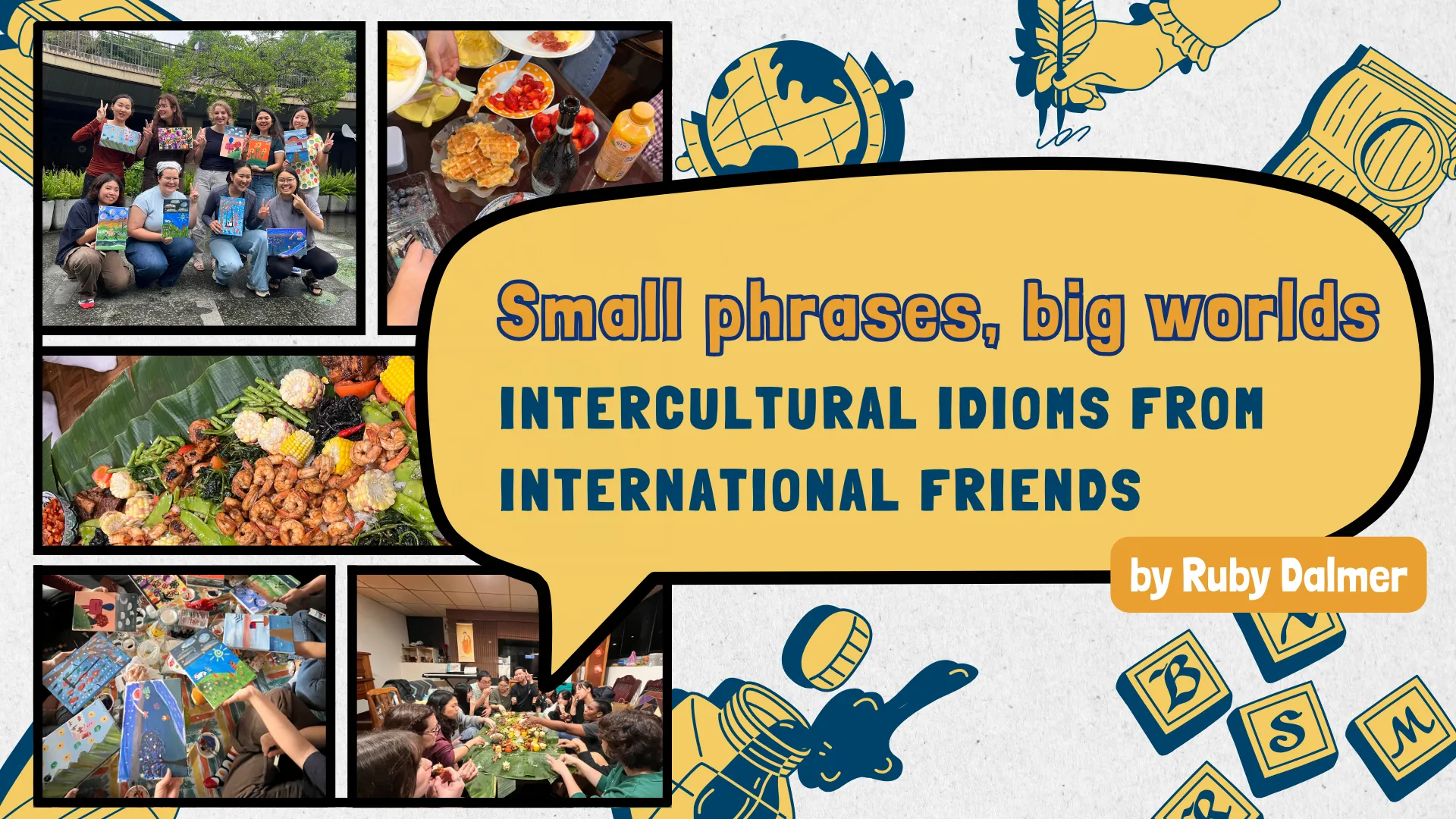NCCU is a colourful microcosm of the world’s intercultural delights. In any given classroom, 30 different nationalities could be present at any given time. The decision to study here is not just a choice to pursue your respective academic field. Consciously or not, your major will inevitably accompany an informal minor in intercultural communication. In this profoundly international context, students and teachers learn from each other just as much as the content.
A core aspect of our campus’ melting pot character is the incredible variety of languages you hear spoken. As I walk down the halls, my soundscape regularly shifts and morphs from Thai, into German, into Spanish, into Mandarin, into English, and then some. The linguistic diversity is a very special part of life here.
I believe the ultimate function of language is connection. It is how we show empathy and understanding for those we interact with. Put plainly, you speak a language to be understood by another human — something so complex can be as simple as that.
In NCCU’s international programs, even though our primary language of communication is English, there are many elements of mixing in our intercultural interactions. People from all corners of the earth sprinkle and infuse their communication with aspects of their cultural backgrounds.
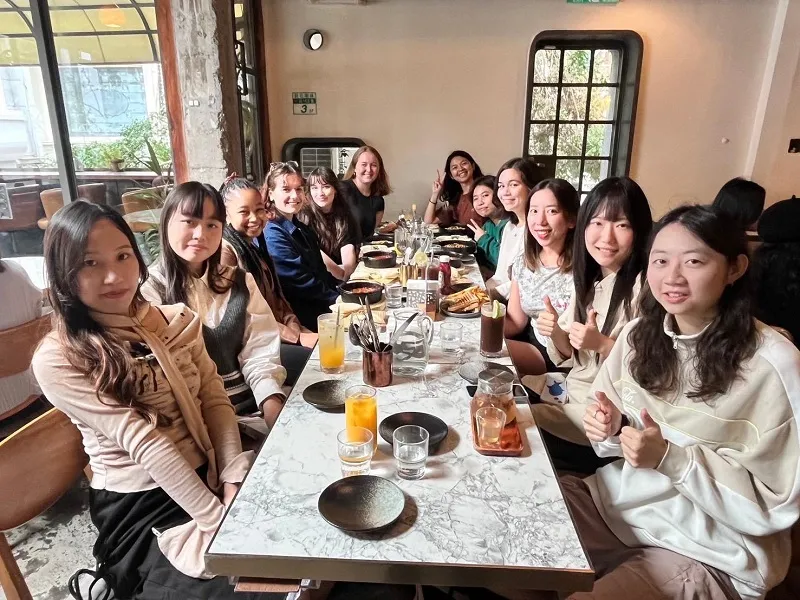
▲My friends from IMAS at one of our International Girls Brunch gatherings
Teaching each other bits and pieces of our mother tongues is a shared happy pastime for many international students. It helps us learn from each other’s linguistic differences and is a major way to bond and connect with people here in Taipei.
Idioms are integral to this process of learning and sharing. In this piece, I’ll unpack the cultural dimension of idioms and spotlight the interesting idioms from the home languages of my international friends.
Words construct worlds
Words reflect and construct our world. According to the Sapir-Whorf hypothesis, our language shapes our perception of the world. Language colours our reality — and different languages colour different aspects of reality.
But this isn’t just a metaphor. Researchers have found that different communities around the world understand colour differently based on language. For example, the Himba tribe in Namibia has no word to distinguish between blue and green. Think about how different your world would be if grass and the ocean were in the same mental category. The words we use can even bring different colours alive.
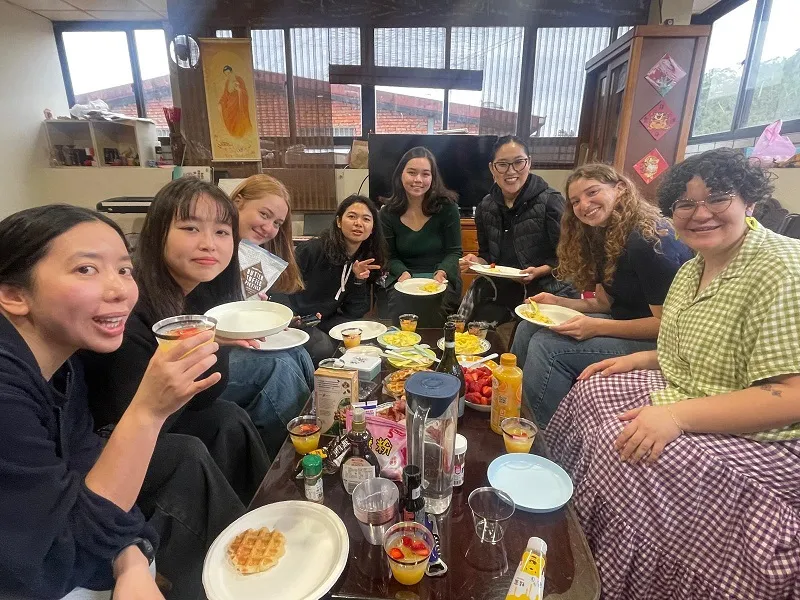
▲A shot of our cooked breakfast hangout
So language is part of the lens we view the world with — and that lens is powerful and complicated.
The power of the idiom
Idioms, in their most basic sense, are common phrases whose overall meaning is different from the literal meanings of the individual words within it. But they are much more than this. Idioms contain multitudes — common expressions of our unique relationships to the world around us. They are metaphors which store vast systems of values, public morals, national consciousness, religion, history, rituals, art, and so on.
They reflect the collective knowledge of a nation. Social experience, historical development, traditions, and beliefs condense and represent micro words of national culture through language. Each language reflects their world — and idioms are the manifestations of this reflection.
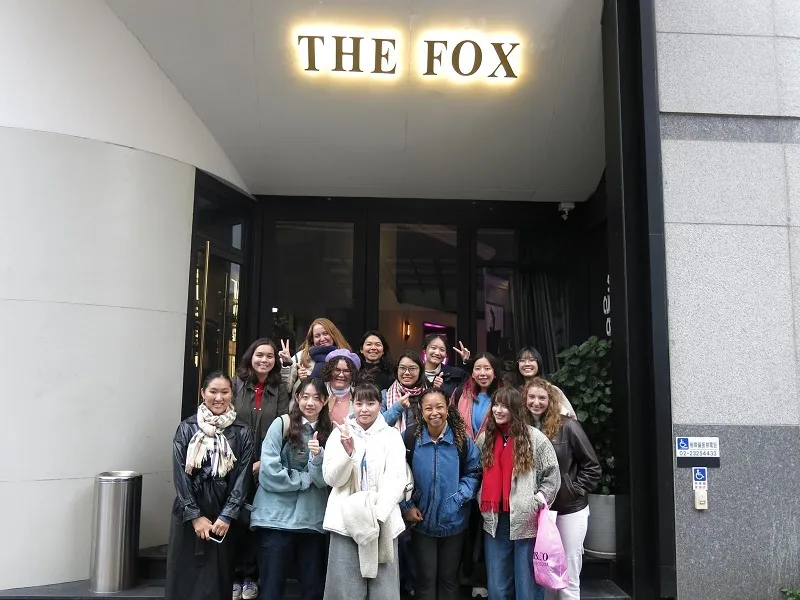
▲8 different countries represented in this photo!
A fascinating quirk of idiomatic expression is the tension between cultural distinctiveness and universality. Though idioms capture unique elements of national collective knowledge, there are some things that are shared cross-culturally. For example, things like desires, intellectual ability, speech acts, and physiological reactions are universal to people of the whole world. Every language has idioms to express these core components of the human experience — regardless of culture, language, or education. Idioms capture this collision of similarities and differences — and there’s something very beautiful in that.
International idioms from international friends
To unpack this power of cross-cultural communication, I asked my international friends to share interesting idioms from their home languages.
I got them to focus on idioms that cannot be understood by piecing apart the literal meanings of words. They only make sense if you are a native speaker, so can only be shared and taught by native speakers. They don’t neatly translate into English — and that’s the point.
These idioms are representations of worlds built inside these languages — so removed from context and put into English, the individual string of words can be very humorous. Inside the humour however, we can gain valuable knowledge about worlds otherwise unfamiliar to us.
Jasenghkwan Saga, Kachin Ethnic Minority, Myanmar
One of my favorite idioms in the Kachin language is “Pu gang yang sin machyi.”
If you translate it literally, it means “When you pull the intestine, the liver also hurts.”
This idiom expresses the deep sense of unity and emotional connection among Kachin people. It means that all Kachin are connected — when one person suffers, everyone feels that pain, even if we are not biologically related. In our community, empathy and solidarity are highly valued; if one person is hurt, the whole community feels that hurt together.
This reflects the Kachin worldview, where collective responsibility, empathy, and care are more important than individualism. People in my culture believe that our well-being is closely tied to the well-being of others. That’s why in times of hardship — such as war, displacement, or tragedy — Kachin people come together to support one another, whether through prayer, donations, or emotional care.

▲ 11 different nationalities are present in this photo
Oyundalai Odkhuu, Mongolia
Тэнгэрийн умдаг атгах – “to grab the navel of the sky”. This Mongolian expression does not translate literally into English which describes a very rare and fortunate event, something that doesn’t happen often and feels almost destined. It’s used when someone experiences unexpected good fortune, like getting a dream job, meeting a special person, or surviving danger by chance.
This idiom is a poetic way to talk about extraordinary luck or a once-in-a-lifetime opportunity. Even though it sounds funny literally, it reflects how Mongolians like to use grand, cosmic imagery to describe human experiences.
Хамарт нь баас түрхчихсэн юм шиг – “as if poop has been smeared on (their) nose”. This expression is often used humorously or critically to describe someone who is proud and arrogant themselves and full of oneself. As if they carry themselves in a way that makes them look superior. Mongolians enjoy using vivid, slightly gross imagery to exaggerate emotions. It’s part of our playful way of speaking.
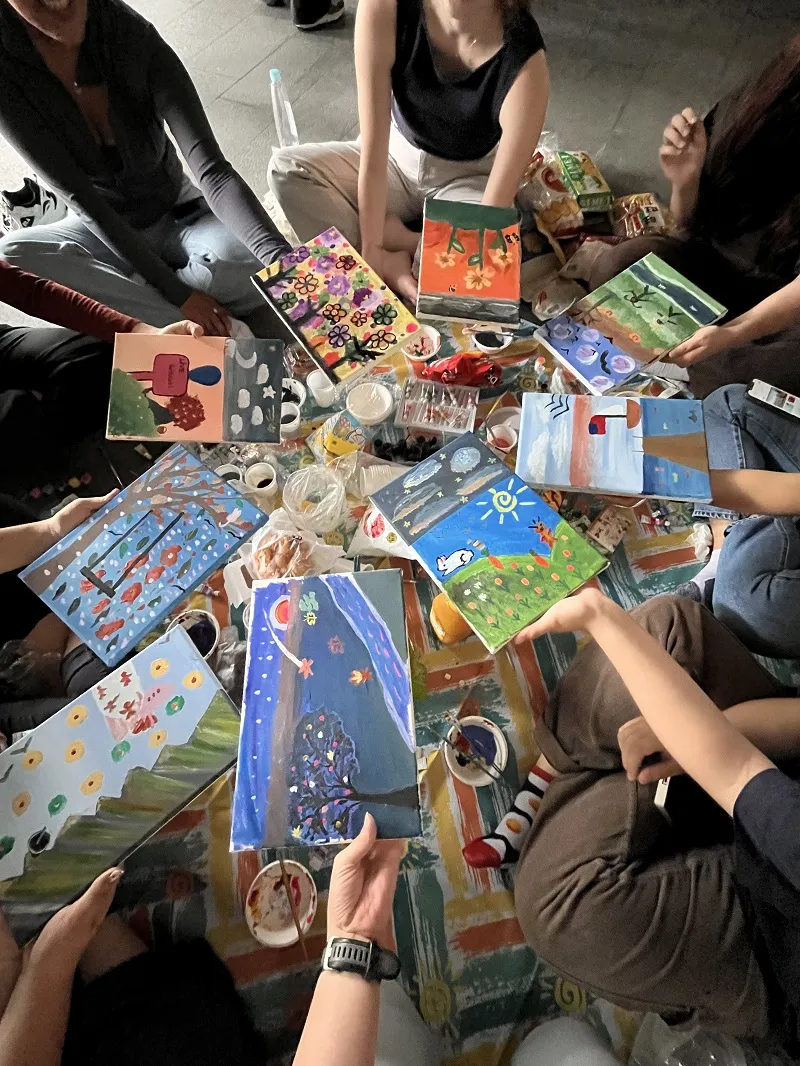
▲A girls brunch gathering where we did our own paintings in Da_an Park
Soolim Nam, Korea
One of my favorite Korean idioms is “빌려온 고양이” (bil-lyeo-on go-yang-i), which literally means “a borrowed cat.” It describes someone who stays quiet and withdrawn in a group setting — like when people are having conversation, but you just sit calmly and don’t join in. The image is of a cat that’s been borrowed by someone unfamiliar, sitting politely and stiffly in a new place, unsure how to act.
I’d explain it like this: imagine you’re taking a course from another department. Some students are chatting before class starts, but you just sit quietly, not sure how to join in. That’s exactly what “a borrowed cat” describes — someone who feels a bit out of place and stays calm and observant.
From my experience, it also reflects how Koreans communicate. We rarely make casual conversation with strangers, the culture of small talk doesn’t really exist. It’s common for conversations to flow only when there’s a shared topic or sense of connection. So sometimes, like on the a first day of a semester, when people don’t know each other yet, everyone ends up being “a borrowed cat” together.

▲Another photo from another girls brunch
Phongkorn Chorkprasertnam, Thailand
In Thai we have the idiom: โรยผักชีบนหน้า (roi phak chi bon na) — “Coriander sprinkled on surfaces”. It means “perform a deed only for the sake of appearance” or “Looks good on the outside but is actually messy or bad on the inside”.
Actually, it can be explained in English as “window dressing” but this Thai idiom really reflects Thai food culture. Because Thai people like to use coriander in cooking and as a garnish, they sprinkle coriander on the food to make it look beautiful and attractive to diners. In reality, it may look delicious, but the taste may not be delicious, which is the origin of this idiom.
Janina Tan, Philippines
“Ikwento mo sa pagong” translates to “tell it to the turtle”. This is a sarcastic way to tell someone something like “yeah right” but we really don’t believe them. It’s like: tell it to someone who’ll believe you. Which in this case, is a turtle. I don’t know how the turtle got involved though.
And my personal favorite ~ “Magdilang-anghel ka sana.” Dila means tongue. The words translate to “may you have the tongue of an angel”. It means, we hope what you say comes true. Because if it comes from the mouth of an angel, it might likely come true.
Tom Van Schoonderwalt, Netherlands
“Nu komt de aap uit de mouw” – Now the monkey comes out of the sleeve. It basically means that a situation or someone's true intentions, or character becomes known all of a sudden, often in a surprising way.
I would explain it as something suddenly being revealed to you where you go like AHAAAA. In my culture it's usually used in a funny way but it can also be used to express surprise in unfortunate or upsetting situations (like catching someone cheating or something lmao). I think Dutch people might use it sometimes because we can be quite cynical.
Léa Glotin, France
A funny one in French is “se prendre un râteau” — which literally means “to get hit with a rake”. It means being rejected (romantically). It’s like: you tell someone you like them without knowing if it’s mutual, and since it’s not… The rake hits you in the face.
Or there’s also: “mettre un lapin”— “to set down a rabbit” which just means standing someone up. No idea why we put down a rabbit to cancel plans but yeah.
Another one is “On n’est pas chez les Bisounours” — literally “we’re not in the land of the Care Bears”. It means: this is not a fairy tale, meaning something like don’t be naive. I feel like in French (or maybe in a lot of Western cultures), cute things aren’t always seen as aspirational, they’re kind of associated with being childish, naive or disconnected from reality.
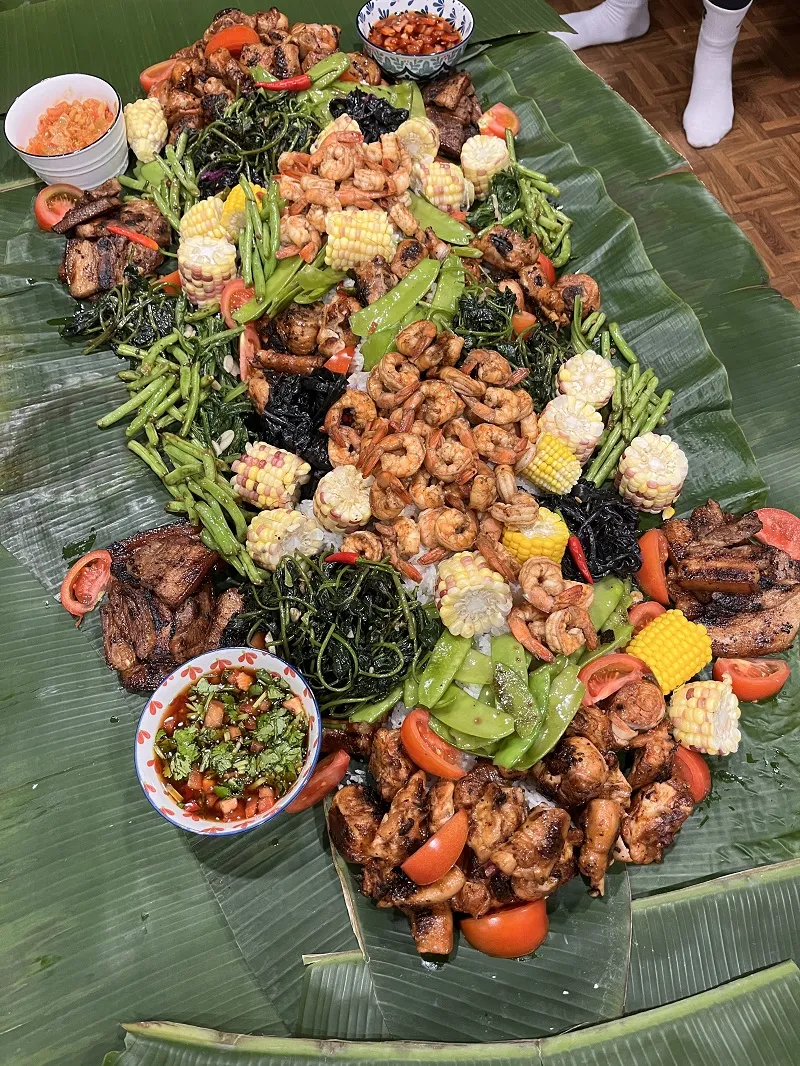
▲IMAS group hangout where we had a traditional Filipino style picnic - everyone contributed and cooked ate together
Tina Zhou - 周怡廷, Taiwan
These phrases we call 成語. We have this one: 脫褲子放屁 — tuō kùzi fàng pì. It means take off your pants and fart. Because normally we can fart with pants but if someone still takes off their pants and farts that means an unnecessary situation!
Danny Widiatmo, Indonesia
We have “Masuk angin” — literally meaning “enter wind” or “trapped wind”. It’s an Indonesian folk concept and traditional diagnosis for various non-specific ailments, often associated with feeling unwell, such as colds, nausea, fatigue, or muscle pain, and attributed to exposure to cold air or environmental factors. While it shares symptoms with the common cold or flu, it is considered distinct by many Indonesians and is treated with traditional remedies like the herbal drink Tolak Angin, or through practices like kerokan (coin rubbing).
Audrey Meloche, Canada
One of Canadians favourite things is to spot fellow Canadians among Americans so there are a few vocabulary that we focus on that are unique to Canada, such as Tuque instead of beanie, Chesterfield instead of couch. Most of the words are niche and don't really come up naturally, but I have encountered a few times in Taiwan saying something that isn't understood. I use washroom to mean toilet which throws people off sometimes, or eavesdrop when talking about a roof gutter.
I think what's more interesting is the interaction with my mother tongue, French, specifically Quebec French. We have many regional expressions, idioms that are unique to Quebec and won't be understood in other French speaking countries either. Most of our idioms sound crazy in English, they sound crazy even in French when we think about it and the meaning is difficult to catch for anyone not from Quebec.
Some of my favourites are 'lâche pas la patate' which mean something like don't give up or keep going sometimes even in a slightly condescending way, but it translates to “Don’t drop the potato”. We say “pull yourself a stump” to mean join us – ‘tire-toi une bûche’ because around a camp fire you’re usually sitting on tree stumps. My grandparents will say ‘J'ai mon voyage!’, in English, “I have my trip”. It’s an exclamation when someone tells an absurd story. And one that is similar to English, is what we say when it's raining to encourage someone to go out anyway ‘t'es pas fait en chocolat’ which is like the expression ‘You’re not made of sugar’ but we say “you’re not made of chocolate!”

▲My friends from IMAS at one of our International Girls Brunch gatherings.

